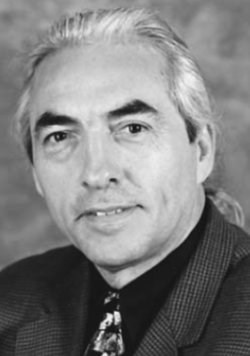NEWS RELEASES
ASSEMBLY OF FIRST NATIONS
METIS NATION OF ONTARIO
************************* AFN national chief applauds yesterday's passage of the UN declaration on the rights of indigenous peoples - recognizing 30 years of work in the making
OTTAWA, September 13 - The national chief of the Assembly of First Nations called yesterday an important day for indigenous people around the world, including First Nations in Canada. "While the declaration is not perfect, it is a step toward setting minimum standards for the survival, dignity and wellbeing of indigenous people everywhere. It's a day to celebrate. This recognition was a long time coming," National Chief Phil Fontaine [shown] said. "The declaration recognizes our collective histories, traditions, cultures, languages, and spirituality. It is an important international instrument that supports the activities and efforts of indigenous peoples to have their rights fully recognized, respected and implemented by state governments."
However, the national chief said he is gravely concerned that the Government of Canada chose to vote against the UN Declaration and, in effect, opposes fundamental human rights protections for indigenous peoples.
Canada lobbied hard to convince other countries to not support the declaration.
It is the first time Canada voted against an international human rights instrument.
Despite Canada's efforts, many countries decided to vote in favour of the United Nations declaration. "The Assembly of First Nations and other representatives of indigenous peoples in Canada offered to work with the government to address the concerns it had and to come to a solution, but that offer was refused," National Chief Phil Fontaine said. "Canada prides itself as a protector of human rights. It is a member of the UN Human Rights Council, yet it is disappointing today to see this government vote against recognizing the basic rights of Canada's first peoples. This is a stain on the country's international reputation."
First Nations chiefs and First Nations representatives invested an enormous amount of work into the declaration over the last 30 years.
The Assembly of First Nations is the national organization representing First Nations citizens in Canada.
************************* Historic UN declaration on rights of indigenous peoples adopted yesterday
NEW YORK, NY - The United Nations has adopted the Declaration on the Rights of Indigenous Peoples at a meeting of the General Assembly at UN Headquarters in New York by an overwhelming majority of 143 votes in favor, four opposed and 11 abstentions.
The Métis Nation, represented by Métis Nation of Ontario President Tony Belcourt, joined leaders of Indigenous Peoples from around the world at this momentous occasion to applaud the nation states which voted to approve the declaration and to express its profound disappointment in Canada and the small number of other countries (Australia, New Zealand, USA) which voted in opposition to its adoption. Mr. Belcourt stated: "This is a truly remarkable milestone in the history of the struggle by indigenous peoples for the recognition of their rights by the global community of nation states. It is the result of debate and negotiation between indigenous peoples and nation ttates for more than two decades since it was first drafted in 1985.
"The declaration is an aspirational affirmation of our rights consistent with international law and as such provides a framework for the protection Indigenous peoples and the promotion of harmonious relations within the states where they live. We call on Canada to work with the Métis Nation and other aboriginal peoples to develop policies and actions which are consistent with the provisions of the declaration despite its opposition to its adoption.
"Now that we have achieved this great moment in history, it is incumbent on all states, including Canada, to work in a spirit of cooperation with Indigenous peoples within their borders towards the implementation of the provisions of this historic declaration."
*************************
